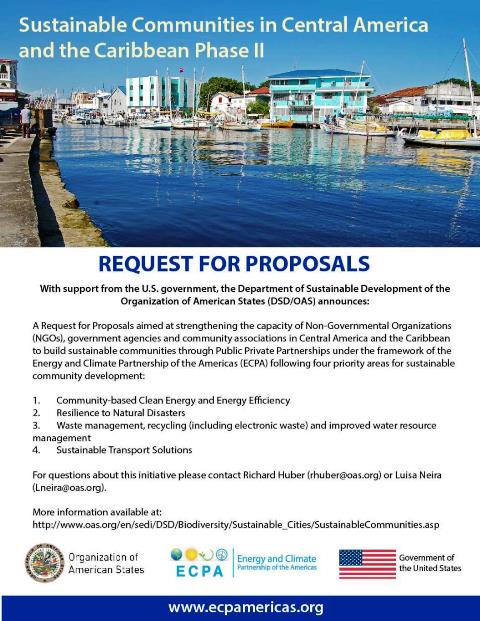
Under a program called Sustainable Communities in Central America and the Caribbean, a new round of small grants will be awarded to support projects that address some of the challenges of rapid urbanization in the region. An initiative of the Energy and Climate Partnership of the Americas (ECPA), the program is managed by the Organization of American States (OAS).
In its request for proposals, the OAS announced that it would award eight grants of up to US $50,000 each to support community projects implemented by public-private partnerships in Central America and the Caribbean. The grants will be awarded on a competitive basis to local nongovernmental organizations, community associations, and academic institutions.
Proposals must focus on at least one of four priority areas: community-based clean energy and energy efficiency; resilience to natural disasters; sustainable transport solutions; or waste management, recycling, and improved water resource management. A steering committee will be formed to review the proposals, which are due by July 28, 2014.
This is the second phase of the Sustainable Communities initiative, which so far has supported projects in 10 countries in Central America and the Caribbean. These include efforts as varied as improving access for pedestrians and bicyclists in five communities in Trinidad and Tobago; developing a microenterprise approach to waste collection in the province of Ocotepeque, Honduras; installing photovoltaic systems for rural electrification in several communities in Nicaragua; and building community resilience to drought, floods and other natural hazards in St. Kitts and Nevis. Other projects have been implemented thus far in Belize, Costa Rica, the Dominican Republic, El Salvador, Grenada, and Guatemala.
Phase II will support implementation of projects, provide technical assistance to the public-private partnerships implementing them, and promote the exchange of best practices. Proposals will be assessed based on a range of factors, including cost optimization, relevance in the context of local needs, expected impact, and increased citizen control over indicators of success and progress related to quality of life. Other factors include the project’s innovation and technical approach, mechanisms or policies to recover costs or promote project self-sufficiency or sustainability, and improved access to information so that citizens can help shape the public debate.
Proposals should be sent to Richard Huber (rhuber@oas.org) and Luisa Neira (Lneira@oas.org) at the OAS Department of Sustainable Development. For additional information, please visit: http://www.oas.org/en/sedi/dsd/biodiversity/Sustainable_Cities/PhaseII/RfPII.asp

 View Map
View Map